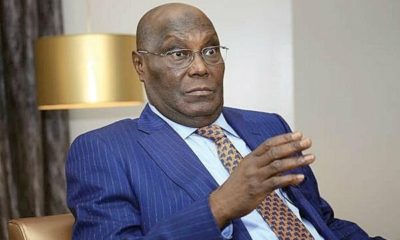It has emerged that the recent war within the fold of Eko Electricity Distribution Company (EKEDC) Plc top management, was the direct outcome of a sharp disagreement between the electricity distributor and West Power & Gas Ltd (WPG Ltd), its parent company over the allegations of fraud, particularly the existence of ghost-workers.
The crisis had reached a head when Dere Otubu, Chairman of the Board of the company, fired Tinuade Sanda, Managing Director and Chief Executive Officer (MD-CEO), citing an alleged directive by the Nigerian Electricity Regulatory Commission (NERC) that all staff of EKEDC, must be sourced from within and nobody should be on secondment.
The letter, dated March 25, and entitled: Implementation of NERC Directive on Seconded Staff, dated March 25 read in part: “We have received a NERC (Nigerian Electricity Regulatory Commission) directive dated March 21, 2024, which instructed Eko Electricity Distribution Plc inter alia:
“EKDC is hereby directed to ensure that all staff working for the utility are employed by the utility directly, bound by applicable service conditions that are applicable to the employees of the utility and paid through the utilities payroll.
“The Disco is obliged to obey these directives due to the power of NERC as stipulated in the Electricity Act 2023. In compliance with the above directive, all seconded staff from WPG Ltd are being released by Eko Electricity Distribution Plc and returned to WPG Ltd.
“You are hereby relieved of your role, office and position at Eko Electricity Distribution Plc effective immediately and returned to WPG Ltd, your employer.”
Babatunde Lasaki, EKEDC’s, General Manager, Corporate Communications and Strategy, had subsequently released a statement, announcing what he said was the board’s decision to appoint Rekhiat Momoh, Sanda’s replacement, though in acting capacity, a statement which was promptly countered by Babor Egeregor Director/Chairman, Legal and Regulatory Committee of the board, who said that Sanda remained on his job as CEO/MD and that her removal and replacement with Momoh by Otubu, were of no effect, NERC gave no such directive as cited by Otubu.
Latest revelations, however showed that the company’s management had been embroiled in internal crisis over who should deal with the case of internal investigation over the allegation of fraud, particularly that of the ghost-workers within its fold between EKEDC and WPG, before the matter finally blew out in the open.
It is said that following the escalation of the alleged fraud by Sandas, in November, George Etomi, WPG Chairman, had on December 5, fired a letter to one Wole Joseph-Condotti, one of the staff seconded to EKEDC, recalling him from his duty as the Chief Legal Officer (CLO), to enable thorough investigation, which Otubu, the company’s boss asked him to ignore.
Otubu, on the same December 5, 2023, while in countering Etomi’s letter, entitled Letter of recall from your position as Chief Legal Officer (CLO) in Eko Electricity Distribution Company Plc (EKEDP) pending an investigation into alleged misconduct,
wrote: “Dear Wola, I was copied in a letter from the Chairman of WPG dated 5th of Dec 2023 recalling you from the position of Chief Legal Officer to Eko Disco. Kindly disregard this letter in its entirety. Eko Disco will continue with the process of looking into the matter. Eko Disco MD who is copied should note accordingly.
However, Etomi, firing back, expressed “shock” at Otubu’s counter letter, had insisted that the rights to recall and or discipline staff are consequential rights of WPG as the CLO’s employer, stressing that the said letter constituted standard practice in such cases, pending the conclusion of the investigation and determination of the matter.
He wrote: Kindly be aware that the issues that have necessitated the recall are very grievous and nothing whatsoever should be done to condone or cover them up. Without prejudice to whatever action you want to take, WPG will go ahead to conduct a full investigation into the matter and I advise all our nominees on the EKEDC Board not to lend themselves to any cover up. The instruction to recall stands and ignoring it will be at the peril of whoever does so.”
The next day, December 6, 2023, Otubu, returned the “surprise” via his own letter to Etomi, saying: “I’m kindly surprised at your letter as I had spoken to you on why your “letter of Recall” should never have been issued in the first place and was therefore disregarded.
“I had pointed out to you that it was clearly improper for you to “singlehandedly” issue instructions of such significance on behalf of WPG and on a matter that relates to you without wide consultations. Furthermore, these instructions are to officers in a separate company “Eko Disco, with significant government shareholding and its processes, Issuing threats to Eko Disco staff is kindly ill advised and of no value. I would therefore kindly request you to allow us the space to conduct the investigation properly.”
Not wasting time, Etomi fired back in return on the same December 6, 2023, stating: “Let me remind you that when you spoke to me it was more about how this matter can be suppressed and I told you very clearly that I would not stand for that.”
Another mail from Simon Ani to Ernest and Otubu on December 13, 2023 shed more light to the ongoing squabble, after he wrote, his own epistle, part of which read: Ernest you have a good point and I agree with you, but you will also note that George (Etomi) has called for a WPG meeting on the 19th and this matter is already listed on the agenda. And in one of George’s (Etomi) mails, to Dere (Otubu), George has already said he will recuse himself/ But your point was in order.
“Chairman D (Otubu) I’m sorry to say but honestly, I think your mails are ill-advised and inappropriate for two reasons. WPG has written earlier this year to all of us Directors on Eko Board, clarifying that we are there representing WPG’s interest.
“WPG employed all senior management. Wola is one of them. And under the O&M Agreement, WPG has overall supervisory responsibility for Eko. The moment we undermine constitutes authority, we also in the process create room for our own authority to be undermined.”
But Otubu, unrelenting in a mail dates Dec 28, 2023 to Tunji Olowolafe entitled: Terms of reference for investigation committee, wrote: Dear Chairman HR, I refer to the directive of the board for the HR Committee to investigate the allegations made against the CL, Pls find attached the terms of reference.
But Egeregor in a mail same day expressed divergent opinions to the mails on ‘Terms of reference for the investigation committee.
He wrote: Dr-(Chairman Investigation Committee), I feel I should urgently raise my objections on the mail you sent to us which had an email trail from Mr. Dere Otubu highlighting what he (Otubu) referred to as ‘Terms of Reference.’ It might interest you to know that this supposed Terms of Reference emanating from Mr. Otubu is at best, his sole idea and completely at variance with the board resolution asking us to investigate the CLO and the allegations of ghost workers as raised by the MD.
In another mail by Egeregor later the same day, he wrote: Dr. Please deliberating on this extraneous Terms of Reference as singularly and surreptitiously introduced by Mr Otubu who openly admitted to being conflicted will be tantamount to delonerating on falsehood and illegality.”
On January14, 2024, Otubu wrote to Sanda: I acknowledge receipt of your message about the information in Sahara Reporters relating to the petition of ghost workers. Kindly note that as MD, your primary responsibility is to protect the company from attacks such as this. You are kindly instructed to take action and protect the integrity and image of the company, the directors, shareholders and all stakeholders from such attacks.’
Sanda on January 15, 2024 replied to Otubu: “Thank you for your below mail, and trusting this email meets you well. As the MD, I have at all times taken steps to ensure the protection of the company’s integrity and brand, which was why I initiated the ghost workers queries in the first place after I was alerted by a whistleblower within the company and did some investigations.
“There can be no doubt whatever of my understanding of the MD’s role and my consistent defence of the company at all times, whether in crises such as the present matter or in relation to NERC or any other party. I always protect the integrity and image of the company at all times and continue to do so unflinchingly.
“However, it is clear that the staff are anxious to know how the matter will be investigated and decided. This has been their clamour since this matter was escalated to me in November 2023.
“There is a feeling of resentment amongst staff at the way the company handled previous instance of job abandonment for a relatively small amount, yet here, a senior officer has been accused on a similar issue, and for such larger sums of money, yet no visible actions. There is a strong and growing perception of injustice and double standards.”

 News3 weeks ago
News3 weeks ago
 News4 weeks ago
News4 weeks ago
 News1 week ago
News1 week ago
 Columns1 week ago
Columns1 week ago
 News4 weeks ago
News4 weeks ago
 News3 weeks ago
News3 weeks ago
 News3 days ago
News3 days ago
 News5 days ago
News5 days ago



















